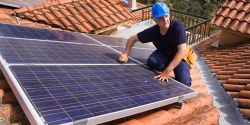

Spot checks on solar installations by MCS inspectors are on the rise, according to Deks UK, which said installers will bear the cost of re-inspection if the installation is found to be substandard.
All solar installations must be carried out by MCS-registered installers, who must follow the government's Microgeneration Installation Standards (MIS). These standards include clear regulations regarding the fixing of solar panels onto roofs.
MIS 3001 2.1a for solar thermal, and MIS 3001 2.1 for solar photovoltaic (PV) systems state that in 'all circumstances the building's weather tightness must be maintained. Holes sealed with mastic or silicone sealant are not considered durable'. The standard also states that 'all roof penetrations (eg for the collector, pipework, cables or bracketry) must be durably sealed using purpose-made products capable of accommodating movement and temperatures to which they may be subjected'.
David Jones, divisional manager of DEKS UK, which supplies flashing products to the roofing industry, said: "Many of the on-roof installations we see do not have appropriate seals around roof penetrations or protection for PV cables, creating problems for the future – or in the shorter term a serious risk of failing the spot checks we hear are currently being carried out by MCS inspectors. If installers fail their MCS accreditation assessments or substantiated complaints are received, then the certificate holder is liable to carry the additional costs of re-inspection which, at current daily rates, will be an eye-watering minimum of £600 plus VAT."
The solar industry has been hit hard by the changes to Feed-in Tariffs earlier this year, making it important for businesses to keep costs to a minimum, but DEKS UK is warning that failing to properly weatherproof roof penetrations and adequately protect PV cables from damage could prove to be a false economy.
NHBC Foundation research shows that an increasing number of roof leaks are being caused by faulty solar installations, which could lead to reduced customer confidence in renewables. DEKS believes that lack of training or understanding how to carry out best practice weatherproofing of pipes and cables is more likely to be the cause than poor installation of the collectors themselves. Failure to adequately protect cables from damage can easily reduce the effectiveness of the system and create a possible electrical danger.
Jones explained: "Under the MIS regulations just because you may not have designed the system you are installing it doesn't mean that you won't be held responsible if the roof leaks. As an installer or sub-contractor you still have to be competent enough to review and verify that the design would meet the MIS standards set out, so lack of knowledge isn’t a valid excuse. Responsibility for fixing solar panels often falls between two trades, roofers and plumbers. Plumbers have little experience of fixing things to roofs and roofers have little experience of working with pipes and penetrations."
Flashing solutions are seldom included in the manufacturers' installation kits but it is a crucial part of the process that is often overlooked. It would be logical to assume that you have bought everything you need, but in the majority of cases flashings are omitted on cost grounds. All manufacturers want to see their products fitted correctly to deliver optimum performance to the end user, yet while the use of flashings is included in training seminars, most of the installation guidelines contained in manufacturers' kits don’t cover recommended ways to seal the penetrations.
If you'd like to keep up-to-date with the latest developments in the heating and plumbing industry, why not subscribe to our weekly newsletters? Just click the button below and you can ensure all the latest industry news and new product information lands in your inbox every week.